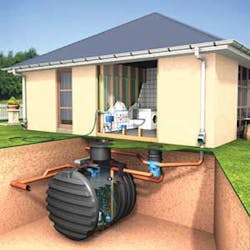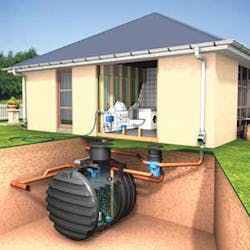Britain's best kept secret ... except in Germany
The rainwater harvesting market in Germany is 300 times that of the UK, contends Lutz Johnen, a founding member of the UK Rainwater Harvesting Association. This alternative water supply plays an important strategic role in the overall German approach to water management.
Lutz Johnen
Three unusually dry winters, followed by a long hot summer, have served to remind everyone of the fragility of UK water supplies, particularly in the south of England where the water available per capita is less than can be found in many Mediterranean and Middle East countries. The inevitable outcome has been the selective but widespread imposition of hosepipe bans allied to a positive blitz of media coverage. This media attention is usually aimed critically at the perceived excessive profits of the utility companies concerned, and their inability to meet water leakage targets.
Why then are similar pressures not being felt in countries such as Germany, where the constraints on water supplies are much greater than in the UK? The answer, very simply, lies in Britain’s best-kept secret, rainwater harvesting, long since discovered in Germany to be at least part of the answer to that country’s water supply problems.
Although scarcely mentioned throughout the current water-shortages debate, the harvesting of rainwater, for subsequent household and commercial use, was once widespread throughout the UK. The practice, however, all but ceased with the introduction of clean, inexpensive tap water supplied via the mains.
Modern rainwater harvesting is no different in principle to the systems still installed on many 19th-century houses throughout the UK. Rain falling on the roof is channelled to a storage tank from where it can be pumped for non-potable use (typically toilet-flushing, clothes-washing and outside taps) as and when required. Modern technology simply introduces easy-to-install storage tanks, high quality filters to ensure water-quality and automatic controls/pumping, to ensure that from the user’s perspective the water supplied is no different than using mains-water.
The water available through rainwater harvesting, almost exactly matches household requirements for non-potable water; a typical 4-bed house, for example, has the potential to supply around 60,000 liters per year in even the driest parts of the UK – broadly matching the non-potable demand. This in turn displaces the mains water that would otherwise be used, in the process making commensurate savings on metered water costs and saving the energy that would otherwise be wasted bringing water destined for toilet flushing up to drinking-water standard. So it is good for global warming too!
The same principles and techniques applied to public/commercial buildings that combine large roof areas with a high-demand for nonpotable water can produce even more spectacular savings, compared to domestic dwellings. The storage tanks for such applications can also support the overall stormwater management of developments by attenuating heavy rainfalls, thus helping to reduce downstream flood risks.
Rainwater harvesting is best designed-in to new-build structures, due to the need to install separate potable and non-potable water supplies. It is probably for this reason that the current UK debate has centred on other water-saving measures that can have an immediate impact. Even in the short term, however, rainwater harvesting can play a useful role by supplying water for garden/grounds irrigation, free of the constraints of hose-pipe bans, and without any need to alter the pipework within existing structures.
In the medium-term, as new buildings are developed, serious national policy consideration must be given to following the German example where the rainwater harvesting market is 300 times that of the UK. At this level, rainwater harvesting plays an important strategic role in the overall German approach to water management – a position brought about by a combination of supply issues, water pricing, and building regulations.
Given a mature market of this size, rainwater harvesting is a mainstream consideration in all new buildings – taken into account by designers and specifiers in exactly the same way as any other utility. The market is also well served in terms of choices, suppliers, installers, and service-providers.
What the UK market currently lacks in size, it aims to make up for in quality. Leading UK based component and system suppliers have already come together in the UK Rainwater Harvesting Association (www.ukrha.org) to make consumer access to this highly-effective, environment-friendly technology straightforward. Members also work to a code of practice designed to reassure end users.
With Parliament due to review national water management policy later this year, rainwater harvesting still scarcely rates a mention even in the preparatory report of the House of Lords Science & Technology Committee. If nationally we continue in the same vein, we will all be denied the benefits of a major auxiliary water supply that has long been enjoyed by our continental cousins.
So now, the secret is out! Modern rainwater harvesting is a reliable and cost-effective supplement to existing national water supplies with which, incidentally, it in no way interferes. It makes possible new developments where water supplies are already operating close to their limit, in the process bringing secondary environmental benefits by avoiding the wasted purification of water destined for non-potable purposes.
The UK has a great deal to learn from the German experience; let us all hope that national policy-makers and influencers take the opportunity to learn. The future integrity of our water supplies partially depends upon it!
Author’s Note
Lutz Johnen is a founder member of the UK Rainwater Harvesting Association and Managing Director of Aquality Trading & Consulting Ltd., based in London.

